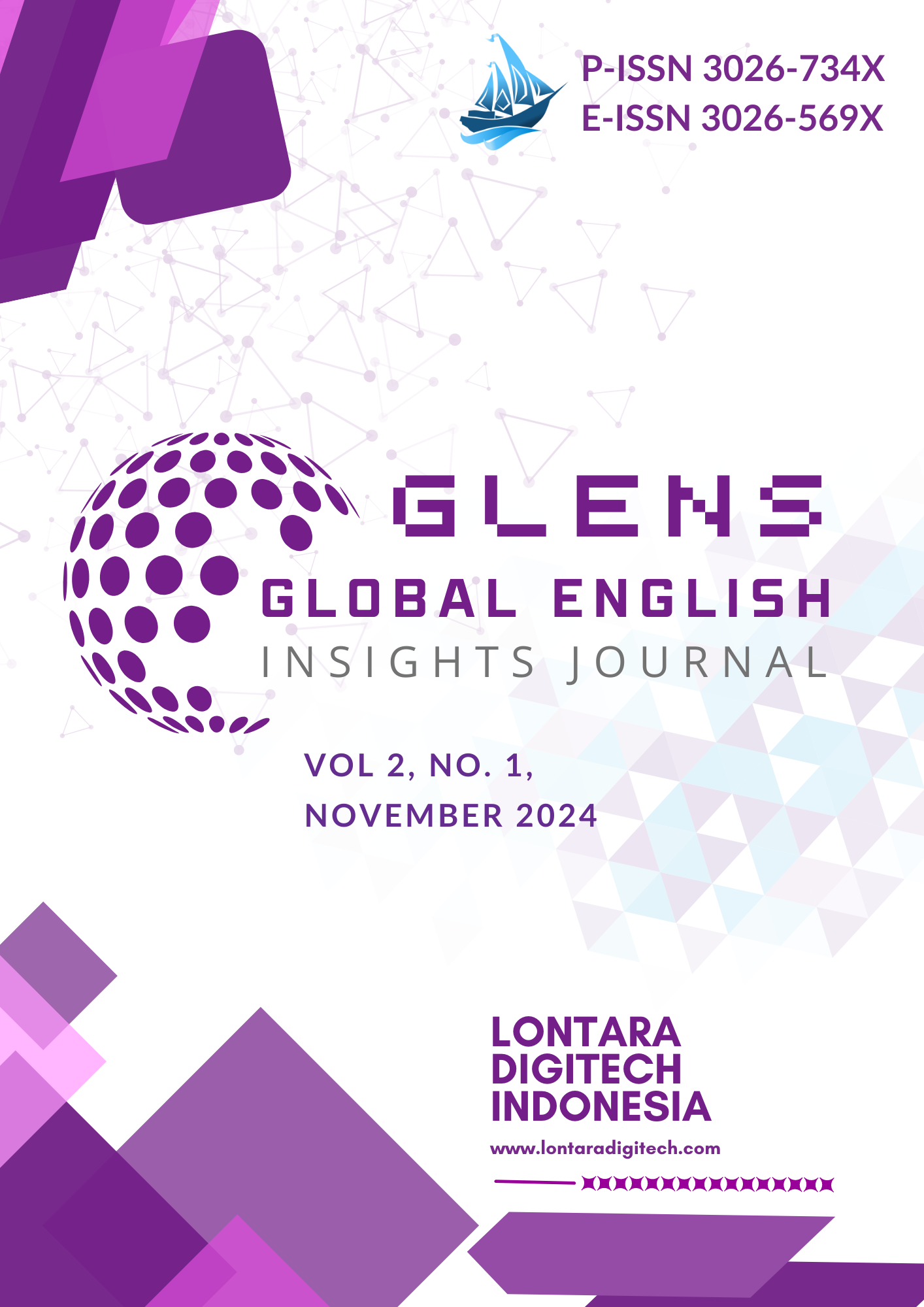Challenges, Benefits, and Motivations in Paraphrasing: Insights from Marine and Fisheries EFL Students
DOI:
https://doi.org/10.61220/glens.v2i1.510Keywords:
Academic Writing, EFL Students, Marine and Fisheries Education, Paraphrasing Challenges, Vocabulary DevelopmentAbstract
This study explores the challenges, motivations, and benefits of paraphrasing for Marine and Fisheries EFL students, aiming to uncover factors that impact their ability to rephrase academic texts. Using a descriptive qualitative approach, data were collected through field notes and semi-structured interviews with 15 purposively sampled students. The findings reveal that students face significant challenges in paraphrasing due to limited vocabulary, difficulties in sentence restructuring, and low self-confidence. Some students perceive English proficiency as less relevant to their future careers, reducing motivation to enhance their language skills. However, regular paraphrasing practice was found to provide valuable benefits, including vocabulary expansion, improved understanding of sentence structures, and increased confidence in handling technical content. These outcomes underscore the potential of paraphrasing exercises to support academic skill-building and professional readiness in specialized fields. The study suggests the need for targeted pedagogical strategies that emphasize vocabulary development, structural flexibility, and confidence-building. These findings contribute to the understanding of paraphrasing in EFL contexts and offer practical recommendations for enhancing students’ language skills in discipline-specific academic environments.
References
Clarin, A. S., Serohijos, S. S., Sumaylo, L. L., & Baluyos, G. R. (2023). The Challenges in Paraphrasing Among English Language Students. EduLine: Journal of Education and Learning Innovation, 3(4), 493–503. https://doi.org/10.35877/454RI.eduline2052
Ghafar, Z. (2023). The influence of self-confidence on English language learning: A systematic review. International Journal of Applied Educational Research (IJAER), 1(1), 55–68.
Hartono, D. A., & Prima, S. A. B. (2021). The Correlation Between Indonesian University Students’ Receptive Vocabulary Knowledge and Their Reading Comprehension Level. Indonesian Journal of Applied Linguistics, 11(1). https://doi.org/10.17509/ijal.v11i1.34590
Hidayati, D. (2022). The Effect of Paraphrasing Strategy on the Students’ Ability in Comprehending Narrative Text at the Eighth Grade of SMP Negeri 1 Mandrehe. The Explora, 8(1), 25–42. https://doi.org/10.51622/explora.v8i1.532
Isma, A., Lestari, I. W., Rohimajaya, N. A., Hardiyanto, A., Susanti, E., Meisarah, F., Novia, S., Kuning, D. S., Hamer, W., & Rasmin, L. O. (2024). Digital Tools for English Language Learning: A Comprehensive Guide for EFL Educators (1st ed.). Yayasan Kita Menulis.
Isma, A., Rasmin, L. O., Hutauruk, T. L., Lestari, I. W., Yuzar, E., Evenddy, S. S., Hamer, W., Wandira, B., Achmad, S., & Rahman, F. (2023). ESP Pedagogy: Designing Effective English for Specific Purposes Courses (1st ed.). Yayasan Kita Menulis.
Keck, C. (2006). The use of paraphrase in summary writing: A comparison of L1 and L2 writers. Journal of Second Language Writing, 15(4), 261–278. https://doi.org/10.1016/j.jslw.2006.09.006
Pratama, Y., Prawesti, A., & Fridolini. (2022). An Analysis of Students’ Writing Skills in Paraphrasing: A Case Study of the 5th-Semester Diploma Students of English Language and Culture Department of Darma Persada University. Getsempena English Education Journal, 9(1), 13–28. https://doi.org/10.46244/geej.v9i1.1711
Relia, C. H., Daud, A., & Delfi, S. (2021). Investigating University Students’ Ability in Paraphrasing Paragraphs. International Journal of Educational Best Practices, 5(1), 79. https://doi.org/10.31258/ijebp.v5n1.p79-94
Rinjani, A. E., & Ovilia, R. (2023). The Relationship between Students’ Paraphrasing Ability, Reading Comprehension, and Vocabulary Mastery. Journal of English Language Teaching, 12(3), 883–892.
Tahang, H., Manuputty, R., Uluelang, K., & Yuliana, Y. (2021). ESP Material for Maritime Affairs and Fisheries School in Indonesia. International Journal of Language Education, 5(3), 152. https://doi.org/10.26858/ijole.v5i3.16258
Tran, T. T. T., & Nguyen, H. B. (2022). The effects of paraphrasing on EFL Students’ academic writing. Journal of Language and Linguistic Studies, 18(1), 976–987. https://doi.org/10.52462/jlls.233
Wahyuni, R., & Cahya, N. (2024). Implementation of RAP Strategy to Improve Learners’ Reading Comprehension. English Teaching and Linguistics Journal, 5(1), 50–56.
Downloads
Published
Citation
Issue
Section
License
Copyright (c) 2024 Ikhwan Wahidin, Muhammad Syauqi (Author)

This work is licensed under a Creative Commons Attribution-ShareAlike 4.0 International License.



















 Email: journalglens@gmail.com
Email: journalglens@gmail.com
